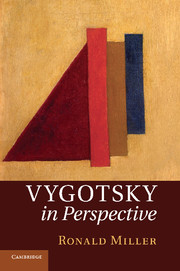Book contents
- Frontmatter
- Contents
- Preface and acknowledgements
- 1 Introduction
- 2 A thematic overview
- PART I Vygotsky at home
- PART II Vygotsky in America
- 7 Michael Cole: artefact-mediated action – setting the record straight
- 8 James V. Wertsch: cultural tools and mediated action – getting it wrong
- 9 James V. Wertsch: mediation and the zone of proximal development
- 10 The essential commentators
- PART III Vygotsky over the rainbow
- Bibliography
- Index
7 - Michael Cole: artefact-mediated action – setting the record straight
Published online by Cambridge University Press: 21 April 2011
- Frontmatter
- Contents
- Preface and acknowledgements
- 1 Introduction
- 2 A thematic overview
- PART I Vygotsky at home
- PART II Vygotsky in America
- 7 Michael Cole: artefact-mediated action – setting the record straight
- 8 James V. Wertsch: cultural tools and mediated action – getting it wrong
- 9 James V. Wertsch: mediation and the zone of proximal development
- 10 The essential commentators
- PART III Vygotsky over the rainbow
- Bibliography
- Index
Summary
In concluding a chapter in which he introduces and summarizes the cultural-historical approach to psychology, Cole (1996, pp. 114–15) makes a revealing observation and poses a reflective question.
American psychologists (myself included) have selectively attended to and borrowed from the ideas of Vygotsky and his followers. How much of what we have borrowed really is in the original? How is the original transformed in the process of translation and appropriation in new cultural-historical circumstances?
Having alluded to and recognized the ‘selective attention’ of ‘American psychologists’, significantly including himself, Cole does not elaborate but leaves the reader to provide answers to his rhetorical questions. Of course, the very fact that he poses the question is itself suggestive of a kind of generalized admission of collective guilt. But the way in which the question is framed in terms of selective attention and borrowing is also a means of selectively directing attention away from a more serious kind of scholarly transgression. Problems of translation are well understood and the appropriation of ideas across generations of scholars is the stuff of scholarship, with well-established conventions regulating the acknowledgement and citation of ideas. Indeed, Vygotsky himself provides an excellent example of how to agree and disagree with thinkers from the past as well as with his contemporaries, especially Piaget, from whom he selectively borrowed as much as he discarded and explicitly rejected. But Cole's question, ‘How much of what we have borrowed really is in the original?’, points to a rather unusual problem.
- Type
- Chapter
- Information
- Vygotsky in Perspective , pp. 205 - 228Publisher: Cambridge University PressPrint publication year: 2011



